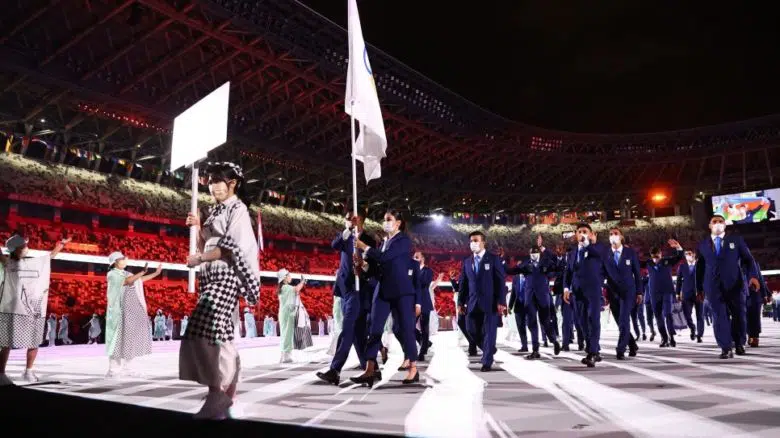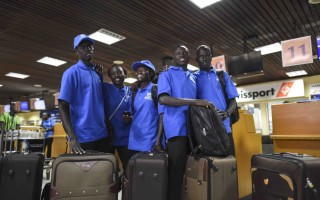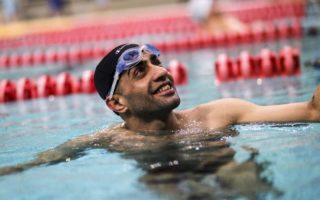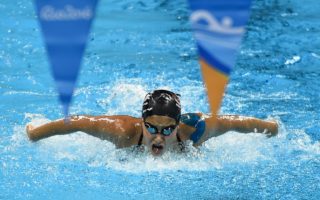
Flag bearers Yusra Mardini and Tachlowini Gabriyesos lead the Refugee Olympic Team during the athletes’ parade at the Tokyo 2020 Olympics Opening Ceremony.
© REUTERS/Kai Pfaffenbach
Opening ceremony features refugee athletes marching out under the Olympic flag, showcasing the power of sport and sending a message of hope to 82 million displaced people worldwide.
By Malcolm Foster in Tokyo, Japan
One is a marathon runner who as a child fled fighting by crossing a desert on foot. Another is a swimmer escaping conflict who helped steer a boatful of people to safety when its motor broke down by jumping into the water.
The 29 members of the Refugee Olympic Team have all endured hardships fleeing from their homelands amid conflict or persecution, and faced difficulties adjusting to new cultures. Overcoming all that on Friday, members of the team made an exuberant entrance during the opening ceremony of the Tokyo 2020 Olympic Games, delayed by a year due the global pandemic.
Waving to the cameras, members of the team originally hailing from 11 countries, including Syria, South Sudan, Iran and Afghanistan, entered the stadium second behind Greece, which traditionally leads the parade of nations.
They were led by two flag-bearers — swimmer Yusra Mardini, originally from Syria, and marathoner Tachlowini Gabriyesos, who fled Eritrea. They held aloft a white flag emblazoned with the five Olympic rings representing the five continents — the flag under which they will compete. For the first time at an Olympics, each team was led by both a male and female athlete.
After parading into the stadium wearing navy suits and waving to the cameras, the team was later welcomed by the President of the International Olympic Committee (IOC) Thomas Bach during his opening address.
“Dear refugee athletes, with your talent and human spirit you are demostrating what an enrichment refugees are for society,” he said. “You had to flee from home because of violence, hunger or just beacause you were different. Today, we welcome you with open arms and offer you a peaceful home. Welcome to our Olympic community.”
Five years ago, in Rio de Janeiro, 10 athletes from four nations made up the first Refugee Olympic Team. The IOC created the team in partnership with UNHCR, the UN Refugee Agency, to raise awareness of the plight of refugees and send a message of hope to fellow refugees and to the world.
“It is something that gives us that hope that the world recognizes us as human beings,” said James Nyang Chiengjiek, who will compete in the 800 metres race. He was also part of the team in Rio. “Sport has opened the doors for us, and now we are seeing that so many refugees have talent.”
As a boy, Chiengjiek fled his home in South Sudan to avoid being recruited as a child soldier and made his way without his parents to the sprawling Kakuma refugee settlement in northern Kenya, where his running talent was first discovered.
Normally, incoming athletes are greeted by the roar of the crowd, but due to COVID-19 countermeasures that mean spectators are unable to attend, this year the stadium was strangely quiet, turning the ceremony largely into a TV event watched by millions around the globe.
UN High Commissioner for Refugees Filippo Grandi, who is in Tokyo this week to support the team, described watching the Refugee Olympic Team enter Tokyo’s Olympic Stadium as a moment of immense pride for him and all of UNHCR.
“To see these refugee athletes honoured and applauded on the Olympic stage was a significant moment for representation of the world’s more than 82 million displaced people, and a reminder to the world that, given the opportunity to pursue their dreams and passions, refugees are powerful contributors to society.”
UNHCR has worked closely with the IOC since 1994 to provide access to sport for young people affected by displacement. In that time, global forced displacement has risen steadily and currently affects more than 82 million people around the world.
In the run up to Tokyo, the IOC supported 56 promising individuals with Refugee Athlete Scholarships to help them in their qualification efforts. The final team of 29 met a number of criteria, including holding refugee status as confirmed by UNHCR, and a high level of performance in their particular sport as confirmed by the IOC.
By country of origin, the most — nine athletes — come from Syria, which has been plagued by conflict since 2011. Five previously lived in Iran, four in South Sudan and three in Afghanistan. Other countries of origin include Eritrea, Iraq, the Republic of the Congo, the Democratic Republic of the Congo, Cameroon, Sudan and Venezuela.
“Giving up isn’t me.”
Gabriyesos, 23, fled fighting in Eritrea at age 12, making an extraordinary trek northwards across Sudan and Egypt, including crossing part of a desert on foot, to reach Israel, where he sought refugee status. He now lives and trains in Tel Aviv, where he runs with a local club.
Initially Gabriyesos ran shorter distances — 3,000m, 5,000m, 10,000m and the half-marathon — before attempting the marathon. In March, he ran in only his second official marathon, finishing in a fast time of 2:10:55, which is under the Olympic marathon qualifying time. “Giving up isn’t me,” he said in an interview before the Games.
This will also be the second Olympics for swimmer Mardini, 23, who will compete in the 100 metres butterfly. Originally from Damascus, Mardini was a competitive swimmer who represented Syria in international meets. But as the conflict in her country worsened, she and her sister left in 2015 to try to get to Europe.
“Sport saved my life.”
From Turkey, Mardini boarded a small boat for the 10-kilometer trip to a Greek island that was supposed to take 45 minutes. When the motor on the rubber dinghy, meant for six or seven people but carrying 20, broke, she and her sister were among those who got into the water and swam to lighten the load and bring the boat safely to shore.
Subscribe to UNHCR’s mailing list
Mardini eventually made her way on foot and by bus to Berlin, Germany, where she now lives. Like other athletes, she said sport gave her life meaning and direction during her adjustment. “I tell my story because I want people to understand that sport saved my life,” she said.
Now a UNHCR Goodwill Ambassador, one of her main messages is that refugees are normal people who have been forced to flee their homes due to circumstances outside their control.
“I think it’s a great opportunity to represent millions (of refugees) around the world, to represent that those people are normal and have dreams,” Mardini said. “I also want to remind everyone that refugees are still in the camps, and they really do need our help.”
Originally published by UNHCR on 23 July 2021.





